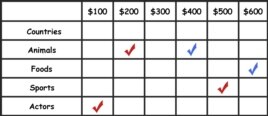26 March 2020
Hi, everyone!
You might be reading or listening to this Everyday Grammar program from your living room or bedroom. In fact, you might be even wearing pajamas, no matter the time of day.
If you are like us here in Washington, D.C. and many other places, health officials have asked you to stay at home for now.
And with so many people at home for long periods, people are looking for activities to keep their minds occupied. Too much time on social media can be a problem. Even binge-watching movies and television shows loses its appeal after a while.
With this in mind, we will be offering ideas for games that you can play with your family or housemates in the coming weeks to practice your English.
What is Jeopardy?
On today's program we will talk about Jeopardy, a favorite game of English learning classrooms.
The idea comes from the American television game show in which players give their answers in the form of a question. You may have even seen the show in your country.
In Jeopardy, players choose from categories and try to win money, like this:
(Player) I'll take Countries for $100.
(Host) This Asian country is famous for its high-quality motorcycles
(Player) What is Japan?
(Host) That is correct!
Notice that the answer came in the form of a question: "What is Japan?"
You will also note the host read a fact in statement form. We will call those facts clues.
Playing Jeopardy at home is a good way to get experience forming questions in English. It also can improve your speaking and listening skills, and help expand your vocabulary.
Now, let's talk about how to play the game. You will need three or more English learners – one person to serve as host and the others to play.*
There are two ways to play the game: the traditional way (with answers in question form) and the easier way, which you can find on our website at www.21voa.com.
How to play - traditional
Here is how to play the traditional way.
The first step is to decide who the host will be. His or her job is to gather clues for the game. The host also reads clues to the players, and keeps a record of points won.
To play the game, you will need five separate categories. For example, you might choose: Countries, Animals, Foods, Sports and Actors. For each category, choose six clues, from easy ($100) to difficult ($600).

You can use this image as a guide for how to draw the Jeopardy grid. Note that the check marks represent points won by players or teams.
The host will need to keep the clues on a computer screen or write or print them on a small piece of paper.
To set up the game, you will need a board or large piece of paper. (If using paper, put it on a wall for all the players to see.) On the large paper or board, make a grid like the simple design shown on our website.
Write the categories on the left of the grid and the money amounts across the top.
For the full directions on how to play the game, to see how to make the grid, and for links to clues that are already prepared, go to our website.
And join us again soon for more grammar games you can play at home.
I'm Alice Bryant.
Alice Bryant wrote this story for Learning English. George Grow was the editor.
For Jeopardy game directions, click here.
*If you are the only English speaker in your home, you can play the game in your native language.
_____________________________________________________________
Jeopardy Clues
Click the links below for Jeopardy clues that have already been prepared. The host can print them or write them on pieces of paper.
______________________________________________________________
Words in This Story
pajamas – n. clothing that people wear in bed or while relaxing at home
binge-watching – n. watch multiple episodes of (a television program) in rapid succession, typically by means of DVDs or digital streaming
housemate – n. a person who lives in the same house with another person but is not a part of that person's family
practice – v. to do something again and again in order to get better at it
category – n. a group of things that are similar in some way
host – n. a person who talks to players on a game show
clue – n. something that helps a person find an answer to something
vocabulary – n. all of the words known and used by a person
board – n. a large, flat surface attached to a wall or supported on an easel and used for writing on with chalk or markers, especially by teachers in classrooms